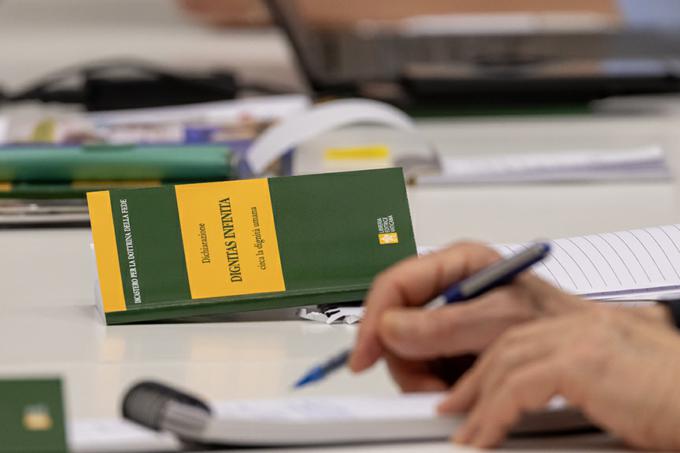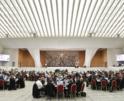
Spirituality
When Our Lord taught, "Love your neighbor as yourself," and a Pharisee asked, "Who is my neighbor?" (Lk 10:29), the Pharisee was asking whether he could draw a line.

Pakaluk
A good way to grasp the central idea of "Infinite Dignity," the recent Declaration of the Dicastery for the Doctrine of the Faith, is to set down this rule: if we are engaged in any project of line-drawing among human beings, about whom to esteem and whom to ignore, we are gravely on the wrong track.
What do I mean by line-drawing? The obvious examples from history are all race-based. Under the Nuremberg Laws, if at least three of your grandparents were Jewish, you counted as Jewish. Mobs might then attack your store with impunity. You'd have no legal recourse.
Sometimes a racial line was drawn merely from appearance. I have a 97-year-old friend who fought in the Battle of the Bulge, and, when he was wounded by shrapnel from a land mine, he was not taken to hospital to have it removed, as the other soldiers were, because he was "colored." "But I have not a single drop of African blood in me," he said to me, "I'm native American."
The Nazis drew other lines based on expressed intelligence. The Holocaust developed out of a German program to eliminate children who suffered from developmental debilities. Such children were deemed "lives not worthy to be lived."
Anyone today who distinguishes "quality of life" from "sanctity of life," and rejects his fellows based on a perceived lack of "quality," is likewise engaged in a project of line-drawing.
Yet another line we can draw is geographical. Nationalism in its distorted forms holds that only the members of my own country should be esteemed; others may be neglected. This is to draw a line matching a political boundary. Coastal elites may show contempt for "flyover country." This is to draw a line around an imagined lifestyle boundary. Some draw a line around the entire continent of Africa and become concerned solely with limiting population growth.
These last examples show that line-drawing is unfortunately not a relic of the past. The most blatant and most egregious form of it is found in legal abortion. To make abortion legal, is to remove the protection of law from our fellow human beings, our neighbors, in the womb. The Biden Administration supports legal abortion until birth. They draw a line at birth. Trump was recently in the news for contemplating whether 12 weeks would be a good time for banning abortion. He's engaged in line-drawing also.
I speak of line-drawing because this really is the primary sense of "finis" in Latin. It means a boundary, marked as if by a line. If something is finite, a line may be drawn around it. Therefore, to say that human dignity is "in-finis," is to say that no line-drawing within the human race is ever justified.
The principle is grounded in human reason but solidly Biblical, too. When Our Lord taught, "Love your neighbor as yourself," and a Pharisee asked, "Who is my neighbor?" (Lk 10:29), the Pharisee was asking whether he could draw a line. Our Lord then told the parable of the Prodigal Son, concluding, "Who was neighbor to that man?" He asks you and me also: Are you neighbor to the unborn child?
I agree that the title, "Infinite Dignity," is misleading in English. When we hear the word, "infinite," we think without any limitation in any respect whatsoever. We think of a number series which goes on without end. It is natural to hold that only God is infinite in that sense. Any created being, we want to say, is finite and limited.
At first it may look preposterous, overblown, and exaggerated to speak of "infinite human dignity." As a parent, for instance, I can think of no circumstance in teaching my child when I would appeal to his, or to my, "infinite dignity." Mere dignity looks like it's good enough. "That's beneath your dignity" is fine. "That's beneath your infinite dignity" sounds stupid.
But, again, the title in Latin means "without boundaries." I might indeed say to my child, "You must act in view of your dignity as a child of God when you are out with your friends, as much as when you are in the home" -- that is, don't draw lines. Don't have a double standard. Live a unity of life.
At the same time, a reference to a stronger sense of "infinite" is not inappropriate. For example, many people want to draw a line for human dignity at 14 days after conception. Others want to allow IVF, as we see in the news. This is the usual sort of line-drawing. To justify it, people will point to an embryo and say: "Look at that! How can that primitive blob be a person?"
But human dignity is also "infinite" in the sense that it is not contained or held within the limits of the perceptible body. Look at a crumpled body of a sick and starving child in a gutter in Kolkata. How can that twisted thing on the point of death have the same dignity as you or I? (This sort of question has occurred commonly among non-Christians in history.) But he does. His dignity is not encompassed by his physical form.
Viewed in this way, we see that the DDF's Declaration stands in condemnation of most American discourse about abortion in the aftermath of Dobbs.
- Michael Pakaluk, an Aristotle scholar and Ordinarius of the Pontifical Academy of St. Thomas Aquinas, is a professor in the Busch School of Business at the Catholic University of America. He lives in Hyattsville, MD, with his wife Catherine, also a professor at the Busch School, and their eight children. His latest book is "Mary's Voice in the Gospel of John" available from Amazon.
Recent articles in the Spirituality section
-
Some thoughts upon returning from the second session of the synodBishop Robert Barron
-
The actual great transformationMichael Pakaluk
-
Reunions in graveyardsEffie Caldarola
-
Newman and the start of the academic yearMichael Pakaluk
-
Deer in the dusky eveningEffie Caldarola


















